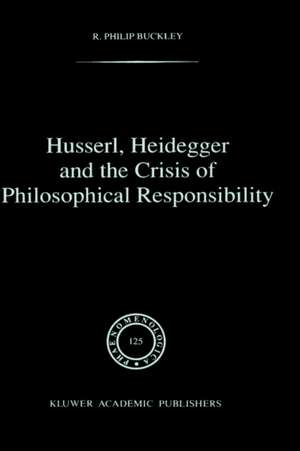Husserl, Heidegger and the Crisis of Philosophical Responsibility: NATO Asi Series. Series E, Applied Sciences, cartea 125
Autor R. Philip Buckley, Philip R. Buckleyen Limba Engleză Hardback – 31 mai 1992
Din seria NATO Asi Series. Series E, Applied Sciences
- 15%
 Preț: 594.38 lei
Preț: 594.38 lei - 15%
 Preț: 641.71 lei
Preț: 641.71 lei - 15%
 Preț: 593.89 lei
Preț: 593.89 lei - 15%
 Preț: 578.84 lei
Preț: 578.84 lei - 15%
 Preț: 600.26 lei
Preț: 600.26 lei - 15%
 Preț: 605.49 lei
Preț: 605.49 lei - 15%
 Preț: 587.83 lei
Preț: 587.83 lei - 5%
 Preț: 656.26 lei
Preț: 656.26 lei - 15%
 Preț: 593.41 lei
Preț: 593.41 lei - 15%
 Preț: 600.80 lei
Preț: 600.80 lei - 15%
 Preț: 607.33 lei
Preț: 607.33 lei - 15%
 Preț: 605.82 lei
Preț: 605.82 lei - 18%
 Preț: 800.42 lei
Preț: 800.42 lei - 15%
 Preț: 590.45 lei
Preț: 590.45 lei - 15%
 Preț: 586.20 lei
Preț: 586.20 lei - 15%
 Preț: 602.57 lei
Preț: 602.57 lei - 15%
 Preț: 604.70 lei
Preț: 604.70 lei - 15%
 Preț: 593.08 lei
Preț: 593.08 lei - 15%
 Preț: 531.07 lei
Preț: 531.07 lei - 15%
 Preț: 594.21 lei
Preț: 594.21 lei - 15%
 Preț: 639.69 lei
Preț: 639.69 lei
Preț: 586.02 lei
Preț vechi: 689.43 lei
-15% Nou
Puncte Express: 879
Preț estimativ în valută:
112.15€ • 121.78$ • 94.20£
112.15€ • 121.78$ • 94.20£
Carte tipărită la comandă
Livrare economică 22 aprilie-06 mai
Preluare comenzi: 021 569.72.76
Specificații
ISBN-13: 9780792316336
ISBN-10: 0792316339
Pagini: 328
Dimensiuni: 156 x 234 x 21 mm
Greutate: 0.63 kg
Editura: Springer
Seria NATO Asi Series. Series E, Applied Sciences
Locul publicării:Dordrecht, Netherlands
ISBN-10: 0792316339
Pagini: 328
Dimensiuni: 156 x 234 x 21 mm
Greutate: 0.63 kg
Editura: Springer
Seria NATO Asi Series. Series E, Applied Sciences
Locul publicării:Dordrecht, Netherlands
Public țintă
ResearchCuprins
Abbreviations and References. General Introduction. Part One: Husserl adn the Crisis as Loss. 1. Husserl's Description of the Crisis. 2. The Genesis of the Crisis. 3. The `Crisis' as Leitmotiv. of Husserl's Thought. 4. The Overcoming of the Crisis of Forgetting. 5. The Limits of Responsibility. Part Two: Heidegger and the Crisis as Possibility. 6. Heidegger's Account of the Crisis. 7. Fundamental Ontology and the Crisis as Paradox. 8. Philosophical Responsibility in the Age of Technology. Conclusion. Bibliography.

















